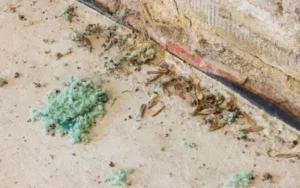Scratching in the walls is never a good sign. No, you’re not living in a horror movie – but you probably do have pests living in your walls.
If you hear scratching in your walls at night, it could be mice, rats, squirrels, raccoons, bats, termites, carpenter ants, or even roaches. They tend to come inside for warmth, and will stay longer if they find ample food and water.
The question is, what should you do next? Here’s what we at Twin Forks Pest Control® recommend:
- Look for additional evidence.
- Determine the pests or animals you’re dealing with.
- Come up with a plan for removal.
- Call a professional pest and rodent control and exclusion company.
I hear scratching inside my wall: what do I do?
It doesn’t take much for pests to find their way into your walls. No matter how small, any open entry point invites insects, rodents, and other small animals to enter your house. Once inside, they’ll enjoy using it as a shelter, food source, and water source.
You might not realize they’re there until you hear scratching at night. Those alarming sounds can wake you up and signal that you need to act fast.
1. Seek Confirmation by Looking for Additional Evidence
If you hear scratching, don’t wait – start looking for more evidence. It’s important to confirm whether you’re dealing with something or not, so you can move onto the next step.
Look for signs like these:
- Droppings: Fecal pellets are a definitive sign. Their size and shape help identify the species (e.g., small and pointed for mice; larger and blunt for rats).
- Gnaw Marks: Look for evidence of chewing on structural wood, baseboards, cabinetry, and electrical wiring.
- Grease Marks (Rub Marks): Dark, oily smudges along walls and floor joists indicate frequently used rodent pathways.
- Nesting Materials: Check secluded areas for accumulated piles of shredded paper, fabric, insulation, or dried plant matter.
- Tracks: Footprints or tail marks may be visible in dusty, low-traffic areas.
- Musk/Ammonia Odor: A distinct, stale ammonia smell often indicates rodent urine and a high level of activity.
- Odor of Decay: A strong, foul smell suggests a deceased animal within a wall void or other inaccessible space.
- Damaged Goods: Chewed packaging on food items in pantries and storage areas.
2. Identify Which Pests You’re Dealing With

If you find additional evidence, you know you’re dealing with something. The question is what. Start paying close attention to the nature of the scratching sounds when you hear them. Write down your descriptions so you can easily describe them if necessary.
Also, when are the scratching sounds happening? By far, the most common nighttime wall-scratchers are mice, and they’re most likely the pests who are disturbing your sleep.
If you’re hearing scratching sounds in your walls, the most likely culprits include:
- Mice: These nocturnal rodents are well-known for their scratching and scurrying sounds as they move within walls and between floors, particularly at night.
- Rats: It can be difficult to differentiate rats and mice in the walls. They’re both nocturnal. However, rats tend to sound louder.
- Squirrels: If the scratching is more noticeable during the day, squirrels could be your daytime visitors, as they are most active then.
- Bats: While often found in attics, bats can also inhabit walls. Their scratching is typically softer, and you might also detect faint flapping or squeaking.
- Birds: Nesting birds can create scratching sounds as they move. It’s worth checking vents or under eaves for any nests.
- Other Pests: Some insects, such as carpenter ants or termites, can produce subtle scratching or rustling noises as they burrow into wooden structures.
What are mice scratching in walls doing?
Mice make scratching noises as they climb, crawl, or dig in your walls. This also means they’re gnawing on your drywall, insulation, electrical wires, or pipes. Like other rodents, mice have two sets of incisors that grow continuously and must be ground down regularly.
Their chewing can damage your walls. It can also lead to house fires by gnawing through electrical wires. Additionally, they may cause flooding by chewing through water pipes.
3. Come Up with a Plan for Removal
Are you going to try to take care of it with DIY methods, or call a professional? There’s no harm in wanting to give it a shot yourself, but be aware that the sooner you eliminate the problem, the better. Once they start breeding, it becomes a much harder problem to solve.
How do you get rodents out of your walls?
Traps are still the most effective way to eliminate a rodent infestation. Make sure you put some kind of delicious bait in the trap, like peanut butter, which rodents love. Cheese can be used in a pinch, but rodents don’t like it nearly as much as you might believe.
We don’t recommend poisoning them. If they do, they’ll crawl into the walls to die. This can cause a nasty smell and pose a health risk.
If your wall pests are another type of rodent or a larger animal, you must cut away a section of drywall and snare the pest with a catchpole. Leave this to wildlife removal experts. Raccoons and squirrels can be aggressive if they feel threatened.
Once you’re sure all the pests are gone, check where they entered. Then seal those openings to keep them from coming back.
4. Call a Professional Pest and Rodent Control and Exclusion Company
If you can’t find the nighttime scratchers, call a pest control expert right away. These problems can escalate as pests multiply and take hold. So, acting quickly is crucial.
Perhaps even more important than getting rid of the problem is making sure it doesn’t come back. When you hear scratching in your walls, it keeps you up at night. It can even make you feel uncomfortable in your own home. The last thing you want is, once you get rid of the problem, for it to come back again a few weeks later. A rodent exclusion expert can help you keep rodents out for good.
At Twin Forks Pest Control®, our pest and rodent control and exclusion includes the following steps:
- Professional Pest Control: We offer safe and effective removal of whatever you’re dealing with.
- Seal Entry Points: Our experts will help prevent future infestations by sealing all potential entry points. We’ll pay close attention to small openings around pipes and any cracks in the foundation.
- Ongoing Support: We offer long-term services so you have the peace of mind that you’ll stay protected.
Call Twin Forks Pest Control® for Wildlife and Rodent Exclusion
Twin Forks Pest Control® has been eliminating pests, including those that find their way into your walls, for more than 20 years. Our trained wildlife experts will remove pests from your property. We also offer year-round protection plans to keep your home pest-free.
At the first sign of problems, call us today for a free estimate.

